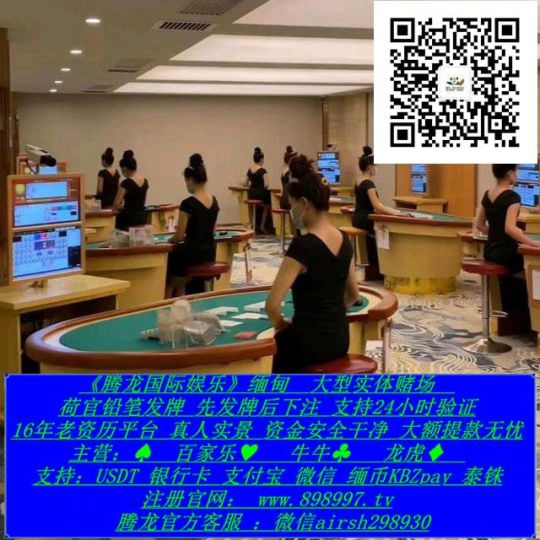#陆游
Text
己酉元日 - First Day of Ji-You
by 陆游 (Lu You, 1125 to 1210)
夜雨解残雪 朝阳开积阴
yè yǔ jiě cán xuě zhāo yáng kāi jī yīn
Night rain melts what was left of the snow, the morning sun parts accumulated cold.
桃符呵笔写 椒酒过花斟
táofú hē bǐ xiě jiāojiǔ guò huā zhēn
Peachwood blessings, with brush breath-warmed, written; pepper-wine amongst the flowers, poured.
巷柳摇风早 街泥溅马深
xiàng liǔ yáo fēng zǎo jiē ní jiàn mǎ shēn
Alley willows sway in the early wind, street mud splashing, deepen the horse's coat.
行宫放朝贺 共识慕尧心
xínggōng fàng cháo hè gòngshì mù yáo xīn
The Travel-Palace opens for the Court's Greetings, so all may know admiration for our virtuous lord.
………………………………………………………………………………………….
NOTES
I've been procrastinating on my original intended New Year poem because I had a feeling the notes for that will be really long xD Oops. But THIS is another homework poem! And a cheerful one to make up for the last (sorry Li Yu lolol).
TITLE
I love this title because it immediately tells us exactly when this poem is set, if not when exactly it was written. Years in Lu You’s time were numbered by the sexagenary cycle, better known as 干支 (gān zhī) or stems & branch, in which a full cycle consisted of sixty combinations of the heavenly stems and earthly branches, representing sixty years. Here is a lovely explanation of how this works.
The Stem-Branch year was usually paired with the Emperor’s era name to identify which year it was. In this case, we only know it was a 己酉 Ji-You year (46th in the cycle)... but we also have Lu You’s birth and death years 1125 to 1210. Comparing that with the list of Ji-You years, we see that there were two Ji-You years in his lifetime. One in 1129 when he was four, and the other in 1189 when he was sixty four. And though he could compose poetry and essays by the age of twelve, I doubt he could have written this at four years old xD
It turns out that despite my confusion, 元旦 is actually an alternate name of 元日, though what we now call the first day of the new agricultural calendar year is 元旦. A quick search of ctext's historical records and compilation sections returned 295 results from both pre and post Qin-Han periods for 元日, while 元旦 returned only 19 from Han and after. This made me SUPER curious because 元旦 is one of the names we know the first day of New Year by these days. Could it actually be newly adopted?
So a deeper dive into the results! 元日 was used as 'first day of the first month' in 《书·舜典》, a chapter of the Book of Documents which was a collection of rhetorical prose attributed to figures of ancient China. It was supposedly compiled by Kongzi (551- 479 BCE) in the 6th or 5th century BCE. Meanwhile, the earliest mention of 元旦 was in《太平御览》Readings of the Taiping Era, which was an encyclopedic document commissioned by the Song Imperial Court that took six years to complete, from 977 to 983 CE. The term 正旦, used in《列子·说符》to refer to the first day of the new year may have been an inspiration for the term. However, 元旦 as we know it in modern times, was in fact first used by Sun Yat Sen in 1912, on the 1st of January as he dated his signoff for the document《临时大总统宣言书》Inaugural Address of the Provisional President. However, this was not the official naming of this day yet. That came in 1949, on the 27th of September, as a result of the first Chinese People's Political Consultative Conference (x).
BACKGROUND
Since we can infer that the title refers to new year’s day in 1189, let’s have a look at what was happening during this period.
Do note that the source used is Baidu, though it seems fairly well researched from what I saw of it (checked only the relevant references for this section xD). I appreciate their dedication to putting together such a detailed timeline from a variety of records and documents!
Some ten years prior in 1179, Lu You had resigned from his post of Changping Supervisor (over granaries) when an official impeached him for insufficient restraint and crossing lines, referencing his actions of ordering for granaries in the commandery to be opened for disaster relief during the Jiangxi floods. He retired to Shanyin, where he had grown up, for five years. In 1186, he was given the post of Yan Prefecture’s Prefect, and was very popular with the people. During this time, he compiled his works in《剑南诗稿》Jiannan Poetry Manuscripts - so titled because he had lived there (Jiannan) for some time and loved it so. Two years later in 1188, his term of office was up. In the seventh month of that year, Lu You returned to the capital and was promoted to the position of Vice Director of Weapons and Military Equipment.
It was Emperor Xiaozong who was in power at that time. He had only just taken full power in 1187 after the death of Taishanghuang Emperor Gaozong (who had remained the de facto ruler despite abdication in 1162), and himself abdicated in the second month of 1189, in favour of his son who became Emperor Guangzong.
I don’t really have the energy to dig deeper than this HAHAAHA, but all in all, it doesn’t seem like a bad time? Things are even looking up, at least for Lu You.
POEM
This one is a five character (eight line) regulated verse known as a 五言律诗 (wǔ yán lǜshī). Here’s a great page on this poetry form.
The parallels in Chinese poems are so neat! I love night rain vs morning sun, remaining/leftover snow vs. accumulated cold/darkness, and especially 解 (jiě) - probably short for 溶解 (róngjiě), melt, but by itself also meaning ‘untie’ and 开 (kāi) which I translated as part, but can also be ‘open’. So simple but effective setting the scene for Winter bowing out for Spring to come in. The first day of the new year marks the beginning of a new sexagenary cycle, it is also known by 立春 (lì chūn) Spring Commences, the first solar term.
In the beginning, 桃符 (táofú), peach wood amulets, were the engraved door god carvings of Shen Tu 神荼 and Yu Lei 郁垒 who were sent by the Emperor of Heaven to guard people from evil spirits. At first it was just them and their names that were written or carved into the peachwood, but gradually it became the trend to also write blessings as well. Meng Chang, ruler of Later Shu of the Five Dynasties Ten Kingdoms period, later in 964, became the first person to write a couplet on the peachwood. This was the earliest form of what came to be known as 春联(chūn lián), Spring Festival Couplets. By the Song Dynasty, writing Spring Festival Couplets had become customary for new year festivities. It was one of two options, one was the door gods, the other were auspicious couplets.
Do you know the !!!! excitement I felt when I saw 呵笔 (hē bǐ) and immediately imagined 一气呵成 (yīqìhēchéng)? It was such a confident, calm and awesome mental image of someone writing their paired couplet soooooo smoothly, in a single breath, that I was almost disappointed to find 呵笔 was a real word for describing the action of warming the brush with one’s breath from the mouth. But actually, it brought such a down-to-earth and everyday picture to the table that I was charmed instead.
How can there be festivities without wine? There is, of course, 椒酒 (jiāojiǔ) which is a type of alcohol infused with pepper and cypress leaves, drunk in the spirit of warding off illnesses and other nasty things.
With the arrival of the season of Spring, people awaken and begin to busy themselves going about their usual practice and rituals. In the house of an educated and cultured man like Lu You, the couplets were likely written by himself. How fun!
Besides the home activities, there is also another important event for court officials. And that is… respect to be paid to the Emperor; to bow, greet and offer their congratulations for the New Year. And that is how we get the next line taking us to the streets, with willows swaying in the morning breeze and melted snow turned to so much mud in the streets. The horses, perhaps pulling carriages, are splashed with the mud, and hence their coats darken under that. Can I just say, 溅马深 (jiàn mǎ shēn) is such a lovely and interesting way to phrase it!
I could not for the life of me figure out why the officials are having to be let in (i.e. 放行) in a 行宫 (xíng gōng), travel-palace of all places for their annual 朝贺 (cháo hè), and I continue to be confused. After a bit of poking around, I found that later in 1189, after Emperor Xiaozong abdicated for Emperor Guangzong, he moved to live in Deshou Palace like his adoptive father Emperor Gaozong before him. Emperor Xiaozong renamed the main body of Deshou Palace as Chong Hua Palace. The remaining part had been renamed Cifu Palace before and was occupied by Empress Wu, wife of Emperor Gaozong. Perhaps he had moved in in advance and was testing out the area?
Anyway, I think seeing the grand picture of officials all lined up in neat rows downstream, paying their respects to the emperor in one voice - that surely is the best way to establish publicly known facts 共识 (gòngshì), that the Emperor is respected by all. And for good measure, he throws in 尧心 (yáo xīn), which is what we call a sagacious ruler. One who is as wise and as virtuous as the Emperor Yao.
Add on because I was too sleepy last night to write the closing paragraph:
LOVE that we get to peek into new year activities this way in the capital of Southern Song. I like to think of this as the equivalent of a preserved instagram photo in that it is a snapshot of several memorable moments in a day, and probably was a trendy thing to do for many people (who could i.e. had that education, training and interest) in that time. Often wonder how these got shared. Do writers keep it at home for themselves, do they show it to their friends during parties, compile it in a collection and bind it for the year? I believe humans have always been humans, and whatever was done, it can't be that far from what we do now!
31 notes
·
View notes
Text
辛弃疾、陆游诗词赏析
青玉案•元夕
辛弃疾
东风夜放花千树,更吹落,星如雨。宝马雕车香满路。凤箫声动,玉壶光转,一夜鱼龙舞。蛾儿雪柳黄金缕,笑语盈盈暗香去。众里寻他千百度,蓦然回首,那人却在,灯火阑珊处。
译文:焰火像是东风吹散了的千树繁花,纷纷落下仿佛星星如雨般坠落。豪华的马车满路飘香。悠扬的凤箫声四处回荡,玉壶般的明月渐渐西斜,一夜舞动鱼灯、龙灯不停歇,笑语喧哗。美人头上都戴着华丽的饰物,笑语盈盈地随人群走过,只有衣香犹在暗中飘散。我在人群中寻找她千百回,猛然回头,不经意间却在灯火零落之处发现了她。
赏析: 这首词作于南宋淳熙元年(公元1174年)或淳熙二年(公元1175年)。当时,强敌压境,国势日衰,而南宋统治阶级却沉湎于歌舞享乐,以粉饰太平。洞察形势的辛弃疾,欲补天穹,却恨无路请缨。他满腔激情、怨恨,交织成了这幅元夕求索图。 …
View On WordPress
0 notes
Text
reading lu you's cat poems...so cute! i love reading things like this because humans have always been humans, and cats have always been cats.
1 note
·
View note
Text
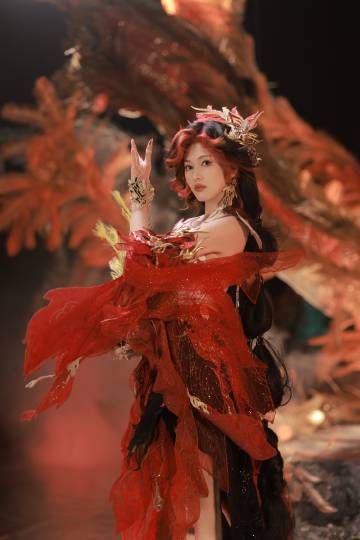

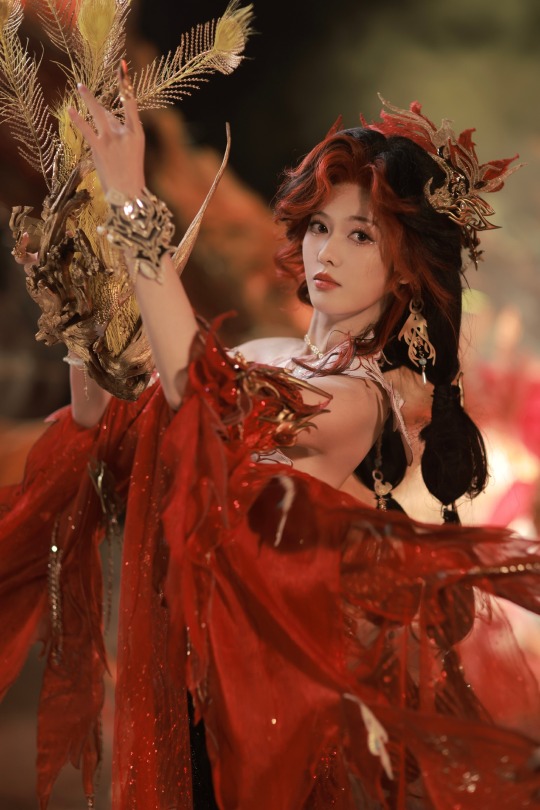

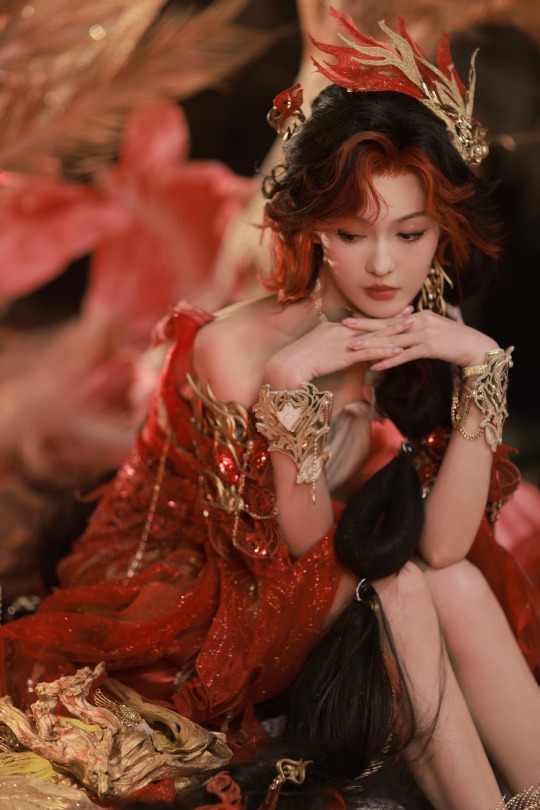

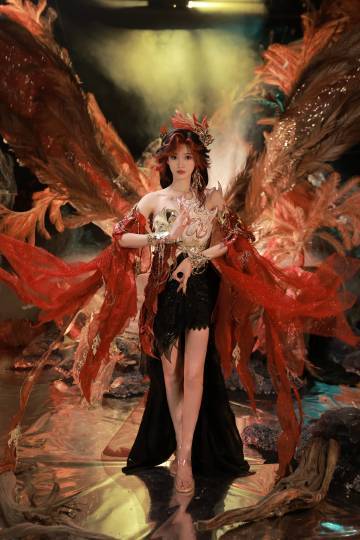

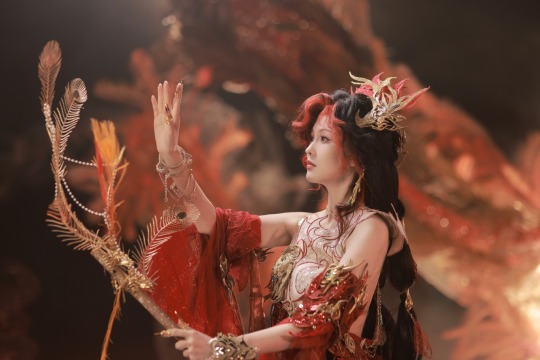
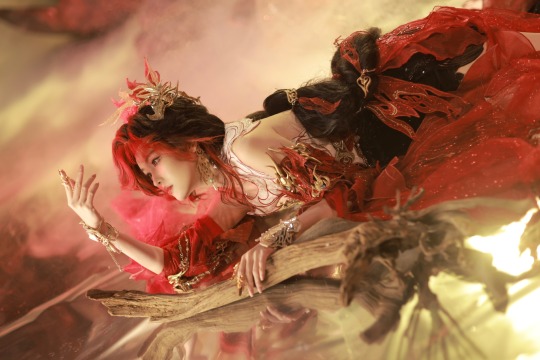

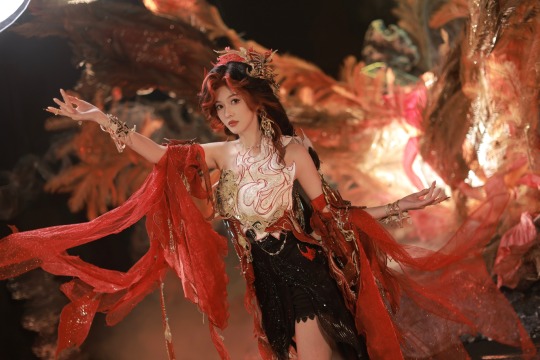

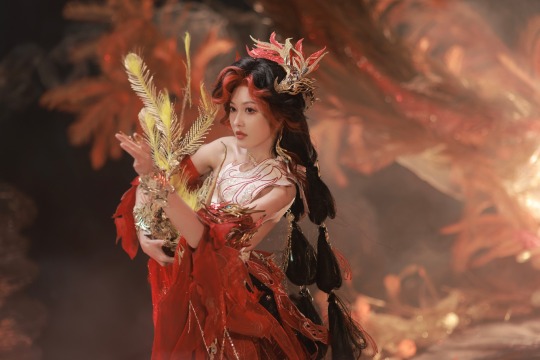


LU TINGYU 陆婷玉 for 逆水寒手游 | brand photoshoot
Lu Tingyu: more photos here
brand photoshoot: more photos here
9 notes
·
View notes
Text
Monkey King Monkey King (2000) 齊天大聖孫悟空


Director: Zheng Shaofeng
Screenwriter: Huang Meijin
Starring: Zuo Xiaohu / Lin Kaiwen / Zhu Guohong / Shi Feng / Wan Yinpeng / Xu Huihui / Mai Maijia / Gao Ming / Liu Ding / Hong Hui / Shao Jin
Genre: Comedy / Fantasy / Adventure
Country/Region of Production: Taiwan, China
Language: Hokkien / Mandarin Chinese / English
Number of Seasons: 1
Number of episodes: 20
Also known as: Journey to the West (Mainland) / 大话西游(陆)
Type: Retelling
Summary:
The Taiwanese version of "Journey to the West" was produced by Taiwan Television in 2000, starring Zuo Xiaohu, Lin Qiwen, and Zhu Guohong. The title of the drama is "Monkey King, Monkey King". When it was broadcast in mainland China, it was also called "Journey to the West". The main plot is still based on the four masters and disciples of Tang Monk and their disciples going to the West to learn Buddhist scriptures, but the plot details have been "slightly" changed.
Source: https://movie.douban.com/subject/30168046/
Link: https://www.youtube.com/watch?v=u8jhcLXmiRM&list=PLtww_vcpAB8pz5kBf0EGlwfukh0K2skzn&index=21&ab_channel=TTV%E5%8F%B0%E8%A6%96%E5%AE%98%E6%96%B9%E9%A0%BB%E9%81%93TTVOfficialChannel
#Monkey King Monkey King#齊天大聖孫悟空#Journey to the West (Mainland)#大话西游(陆)#jttw media#jttw television#television#live action#retelling#sun wukong#zhu bajie#sha wujing#tang sanzang#monk tripitaka#demon bull king#princes iron fan#rewrite
11 notes
·
View notes
Text
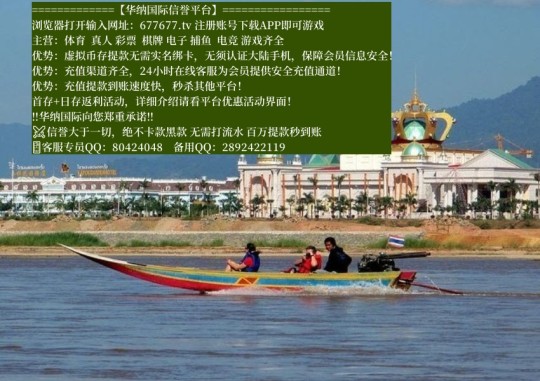
#=============【华纳国际信誉平台】=================#浏览器打开输入网址:677677.tv 注册账号下载APP即可游戏#主营:体育 真人 彩票 棋牌 电子 捕鱼 电竞 游戏齐全#优势:虚拟币存提款无需实名绑卡,无须认证大陆手机,保障会员信息安全!#优势:充值渠道齐全,24小时在线客服为会员提供安全充值通道!#优势:充值提款到账速度快,秒杀其他平台!#首存+日存返利活动,详细介绍请看平台优惠活动界面!#‼️华纳国际向您郑重承诺‼️#⚔️信誉大于一切,绝不卡款黑款 无需打流水 百万提款秒到账#📱客服专员QQ:80424048 备用QQ:2892422119
0 notes
Text

#主营:百家乐 龙虎 斗牛 炸金花 推筒子 大小 单双等多种赌博游戏#优势🔥1️⃣:#不限IP,菲律宾、迪拜、柬埔寨随便玩!#优势🔥2️⃣:虚拟币存提款无需实名绑卡,无须认证大陆手机,保障会员信息安全!#优势🔥3️⃣:充值渠道齐全,24小时在线客服为会员提供安全充值通道!#优势🔥4️⃣:充值提款到账速度快,秒杀其他平台!#☎️客服专员QQ:80424048#🏆平台链接 677677.tv#诚信为本,信誉平台,安全稳
0 notes
Text
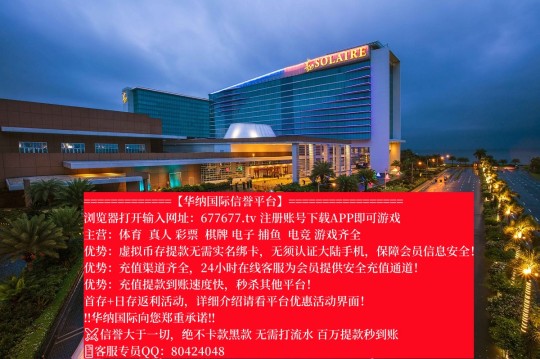
#主营:百家乐 龙虎 斗牛 炸金花 推筒子 大小 单双等多种赌博游戏#优势🔥1️⃣:#不限IP,菲律宾、迪拜、柬埔寨随便玩!#优势🔥2️⃣:虚拟币存提款无需实名绑卡,无须认证大陆手机,保障会员信息安全!#优势🔥3️⃣:充值渠道齐全,24小时在线客服为会员提供安全充值通道!#优势🔥4️⃣:充值提款到账速度快,秒杀其他平台!#☎️客服专员QQ:80424048#🏆平台链接 677677.tv#诚信为本,信誉平台,安全稳
0 notes
Text

疯狂八点游戏玩法介绍
攻破21点高塔游戏玩法介绍
摩天大楼接龙游戏玩法介绍
休闲21点游戏玩法介绍
曲棍球纸牌游戏玩法介绍
二十一点大闯关游戏玩法介绍
混乱纸牌接龙游戏玩法介绍
21点扑克牌游戏玩法介绍
太空纸牌接龙游戏玩法介绍
中国华人赌场
中国大陆赌场
中国澳门赌场地址
#疯狂八点游戏玩法介绍#攻破21点高塔游戏玩法介绍#摩天大楼接龙游戏玩法介绍#休闲21点游戏玩法介绍#曲棍球纸牌游戏玩法介绍#二十一点大闯关游戏玩法介绍#混乱纸牌接龙游戏玩法介绍#21点扑克牌游戏玩法介绍#太空纸牌接龙游戏玩法介绍#中国华人赌场#中国大陆赌场#中国澳门赌场地址
0 notes
Text

#主营:百家乐 龙虎 斗牛 炸金花 推筒子 大小 单双等多种赌博游戏#优势🔥1️⃣:#不限IP,菲律宾、迪拜、柬埔寨随便玩!#优势🔥2️⃣:虚拟币存提款无需实名绑卡,无须认证大陆手机,保障会员信息安全!#优势🔥3️⃣:充值渠道齐全,24小时在线客服为会员提供安全充值通道!#优势🔥4️⃣:充值提款到账速度快,秒杀其他平台!#☎️客服专员QQ:80424048#🏆平台链接 677677.tv#诚信为本,信誉平台,安全稳
0 notes
Text

#python 棋牌源码#开源棋牌游戏官网#棋牌游戏平台服务器搭建教程#开源 棋牌游戏 服务端#汇全国际棋牌苹果下载软件#棋牌游戏禁止手机登陆#汇金国际棋牌安卓版下载#棋牌服务器环境#棋牌游戏数据库下载#棋牌游戏数据统计#棋牌游戏推广外流量
0 notes
Text

#澳门网上赌场#澳门威尼斯人赌场官网#老挝赌场#区块链百家乐游戏#搜索留痕方法#赌球地址#澳门太阳城网址#全球最大博彩公司#网上买球网站#bbin平台直营#博彩公司#加密货币交易所#欧易为什么不清退#中币跑路#亚洲博彩公司#澳门在线赌场#菲律宾马尼拉赌场#正规博彩平台#大陆博彩平台
0 notes
